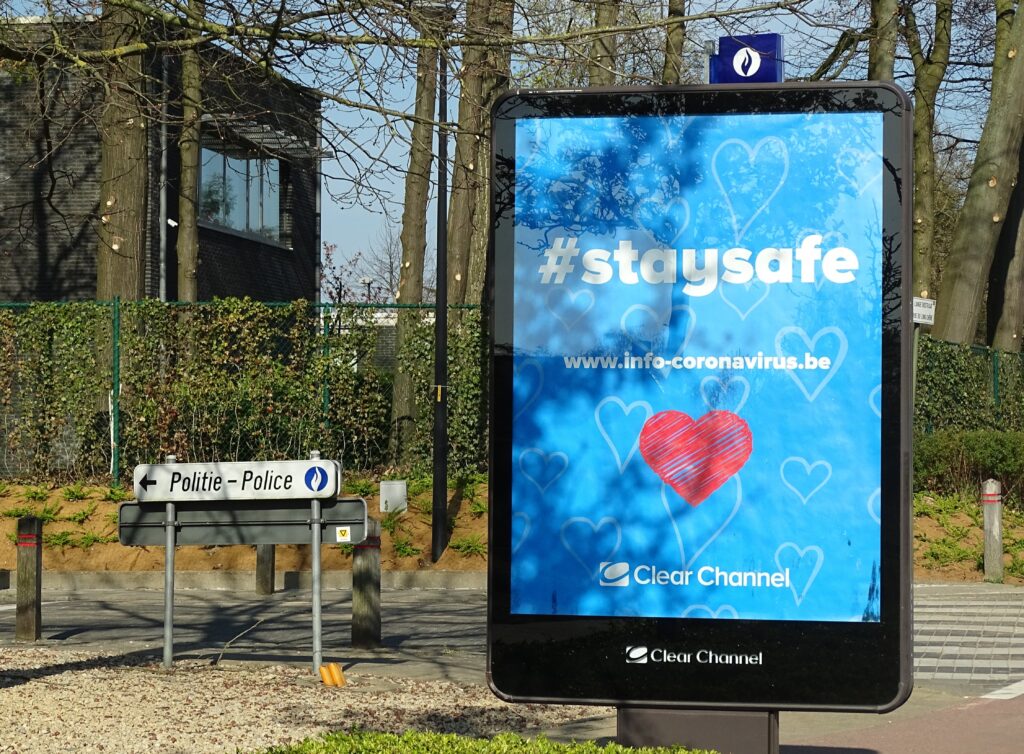Image: G.R. Mottez (2020)
In the 2020-21 ASCA Cities seminar, we will consider recent developments in urban life in the wake of ongoing fallout from the current global pandemic. In taking up the theme of “(Post)Pandemic Urbanism”, we are particularly interested in examining the intersections between digital technologies and contemporary urban environments, from the vantage point of creative, cultural, aesthetic and political practices.
The seminar will take stock of lived experiences in global cities today, with urban inhabitants subject to varying degrees of social-distancing restrictions, often violently enforced, and with crucial aspects of urban lives and livelihoods halted, slowed or intensified. For some, the pandemic prompted a rapid switch to ‘remote’ work, education, and leisure, accompanied by surges in digital gaming and content-on-demand consumption. Meanwhile, existing processes of urban datafication and ‘smart city’ infrastructures have been crucial to making contact tracing a viable option independent of citizen consent. With current warnings of a prevalent “pandemic shock doctrine” (Klein, 2020), how can we make sense of the ‘viral’ city and uneven distributions of risk, exposure and (im)mobility? What alternative visions are being generated for inclusive urban recovery, from the local to planetary scales? What role do digital media play in visually narrating ‘urban crisis’ and a subsequent reclaiming of urban space, for instance, in public protest? And what kinds of inventive methods are being developed to address the current predicament in artistic and cultural practice?
Engaging with and expanding on such questions, the seminar seeks to analyse contemporary cities by exploring a diverse set of topics, case studies and geographical locations. We will consider, for instance, recent work on “playful digitality” and online commoning in global gaming cultures (Jeursen, 2020), and digital intimacy in “platform urbanism” (Barns, 2019), amidst calls for “radical care perspectives” (Fitz/Krasny, 2019), “patchwork ethnography” (Günel et al., 2020) and a sensitivity to “our tools for urban listening” (Mattern, 2020). In doing so, we are not only responding to issues of digital urbanism in the (post)pandemic situation, but also investing in a critical re-assessment of our chosen approaches for the cultural study of cities today.
Semester 1:
Fri. 18 Sept. 2020: Close reading/discussion session. Location: online meeting, Time: 3-4pm.
Fri. 23 Oct. 2020: Digital gaming and urban space – Masterclass with Alfie Bown (University of London). Location: online, Time: 4-5pm.
Fri. 20 Nov. 2020: Sybille Lammes (Leiden University), “Play in times of confinement”. Location: online, Time: 3-5pm.
Fri. 11 Dec. 2020: Tânia Cardoso (University of Amsterdam), “Draw(ing) on absence: Reimagining urbanism in (post)pandemic illustration practice”. Location: online, Time: 3-5pm.
Semester 2:
Fri. 12 Feb. 2021: Fenne Pinkster (University of Amsterdam), “Living in the pandemic city: Diverging emotional geographies of staying home” Location: online, Time 3-5pm
Fri. 19 Mar. 2021: Roy Bendor (TU Delft): “Alternative imaginaries for the smart city”. Location: online, Time: 3-5pm
Fri. 23 Apr. 2021: Shanti Sumartojo (Monash University): “Robotic logics of public space in the COVID pandemic”. Location: online, Time: 10-12 [please note that this talk will start at 10 am]
Fri. 21 May 2021: Simon Ferdinand (University of Amsterdam): “Imagining earth otherwise”. Location: online, Time: 3-5pm
For more information, please contact Carolyn Birdsall (c.j.birdsall@uva.nl), Alex Gekker (a.gekker@uva.nl) or Thijs Jeursen (t.j.jeursen@uu.nl)
